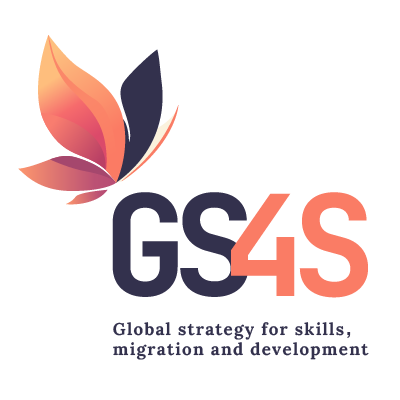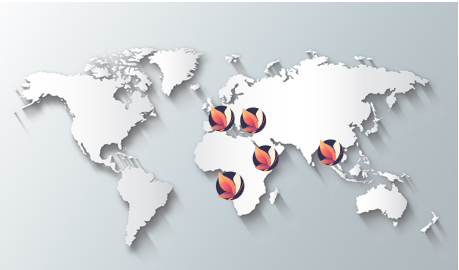PROJECT



The project involves a cross-sectoral consortium: Academia brings expertise in research and data analysis, providing evidence-based insights into challenges and opportunities. Civil Society organizations contribute grassroots perspectives from targeted areas: the Balkans, Middle East/Northern Africa (MENA), West Africa, South Asia. The Private Sector takes a business approach towards addressing skills and labour shortages and contributes data to determine the workforce needs of the three focus sectors. By advocating for the rights and needs of migrants and economic development opportunities for local communities, GS4S creates and implements an imperative for skills development in a systematic and effective manner as a strategic approach to addressing migration challenges and fostering global cooperation and stability.
GS4S develops new knowledge on (1) Gov2Gov mobility schemes and partnerships policies, (2) self-initiated mobilities typically geared towards skills development, and (3) the historical evolution of recognition of qualifications in targeted areas. Through mapping, workshops, seminars and roundtables, and policy briefings, the project facilitates dialogue and collaboration among stakeholders that includes policymakers, who are encouraged to use specially-developed digital tools to act holistically about the issues and consider innovative solutions that benefit both sending and receiving countries. The project’s visual metaphors spark curiosity and engagement, making complex concepts more accessible and understandable. Ultimately, the project aims to inspire policymakers, helping them to take action towards creating a more inclusive and sustainable approach to skills development, migration, and investments.
WORKPLAN
WORKPACKAGE 1 – Scientific/Managerial Oversight
Establishes the foundation for nuanced and context-sensitive scientific and managerial leadership and guidance, with systematic data management in line with scientific and ethical standards; Engages a Scientific Advisory Board in oversight of quality control and scientific relevance.
WORKPACKAGE LEADER
Radboud University, Centre of Migration Law, leading
expertise in MEDT policies
WORKPACKAGE 2 – Migration and Skills Mobility Governance
Conceptualizes migration and development governance through skills partnerships in the context of global value chains; Mapping conditions for designing and implementing successful labour migration and identifying innovative up-/re-skilling schemes; Policy Lab/decision-making tools explore potential policy responses to shortages in priority sectors to better understand opportunities for action and potential constraints, while online closed-door roundtables and policy workshops will bring together policymakers to explore their decision-making processes for responding to shortages and develop an action plan for addressing current and projected shortages in each sector.
WORKPACKAGE LEADER
Foundation Migration Policy Institute Europe, authoritative research and analysis think tank
WORKPACKAGE 3 – Macro-Perspective of Shortages
Empirical comparison of sectoral development, impact of addressing shortages through migrant labour vs. alternative responses, link between automation and migrant workers, and development of a digital tool for identifying shortages and skills waste in the EU, by sector and skill level.
WORKPACKAGE LEADER
European University Institute, teaching and interdisciplinary research on salient societal challenges
WORKPACKAGE 4 – Migration & Skills Mobility Governance
Identify/develop a conceptual framework and assess MNE and SME approaches and trade-offs to filling skill shortages through migration, automation, off-shoring and skill development while facilitating informed policymakers’ decision-making; Foster exchanges to make available a shortage model that assists in the design of skills partnerships.
WORKPACKAGE LEADER
Radboud University, Institute for Management Research, exploring complex problems of governance and management
WORKPACKAGE 5 – Making the most of Migrants’ Skills
Mapping migrant skill waste in the EU and assessing potential for large up-/re-skilling programs to contribute towards more effective strategies against skill shortages; Support of WP2 to identify innovative up-/re-skilling schemes
Forum Internazionale ed Europeo di Ricerche sull’Immigrazione, focused on
the study of social and economic transformations
WORKPACKAGE 6 – Reskilling/Upskilling Impacts
Evaluates re-/up-skilling impact on the local development in countries of origin by assessing the current structures and initiatives of labor markets with regards to the education systems, skills needs, efficient matching, and innovative programming to provide insights into young labor force for better market outcomes; Identifies potential for attracting FDI in non-EU countries via skilling/up-skilling/re-skilling.
WORKPACKAGE LEADER
American University in Cairo, private English-language research university
WORKPACKAGE 7 – Communication, Dissemination, Exploitation, & Impactful Storytelling with Data
Engages target group audiences in an ongoing dialogue around project findings for maximum impact beyond the scientific community (social media; newsletter, working paper series; podcast series) to include the Public, Private and Third Sectors
RELATED
PROJECTS
The GS4S workplan also supports the creation and support of synergies with related projects.
GS4S TRANSFORMATIONS
SISTER PROJECTS:
Link4Skills – A global
research and innovation
project on skill shortages
SKILLS4JUSTICE – Skill
partnerships and just
migration patterns




